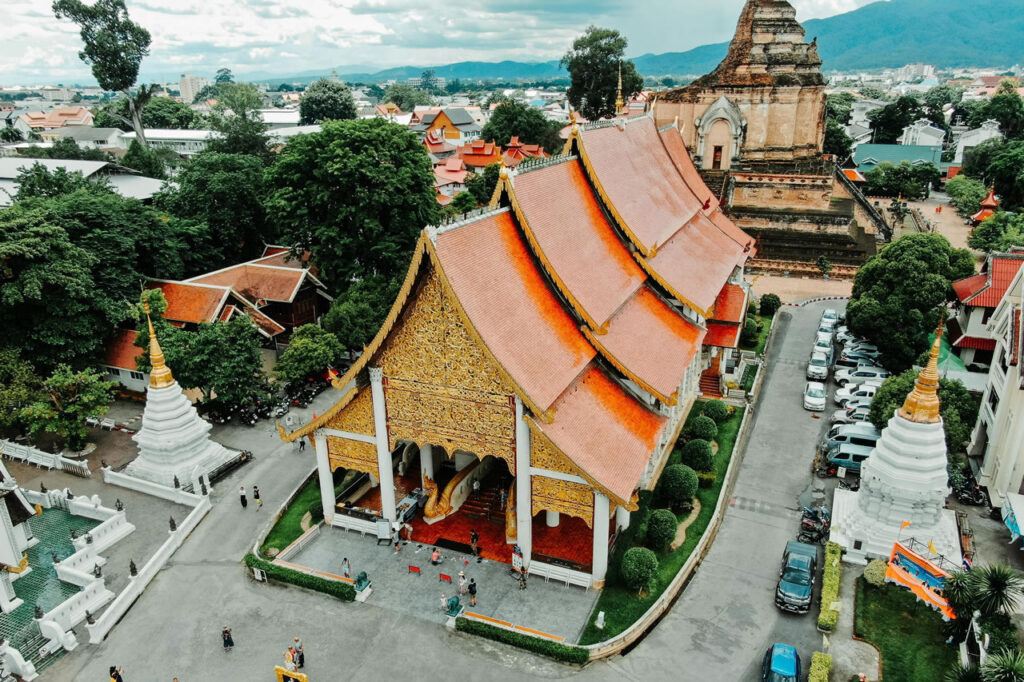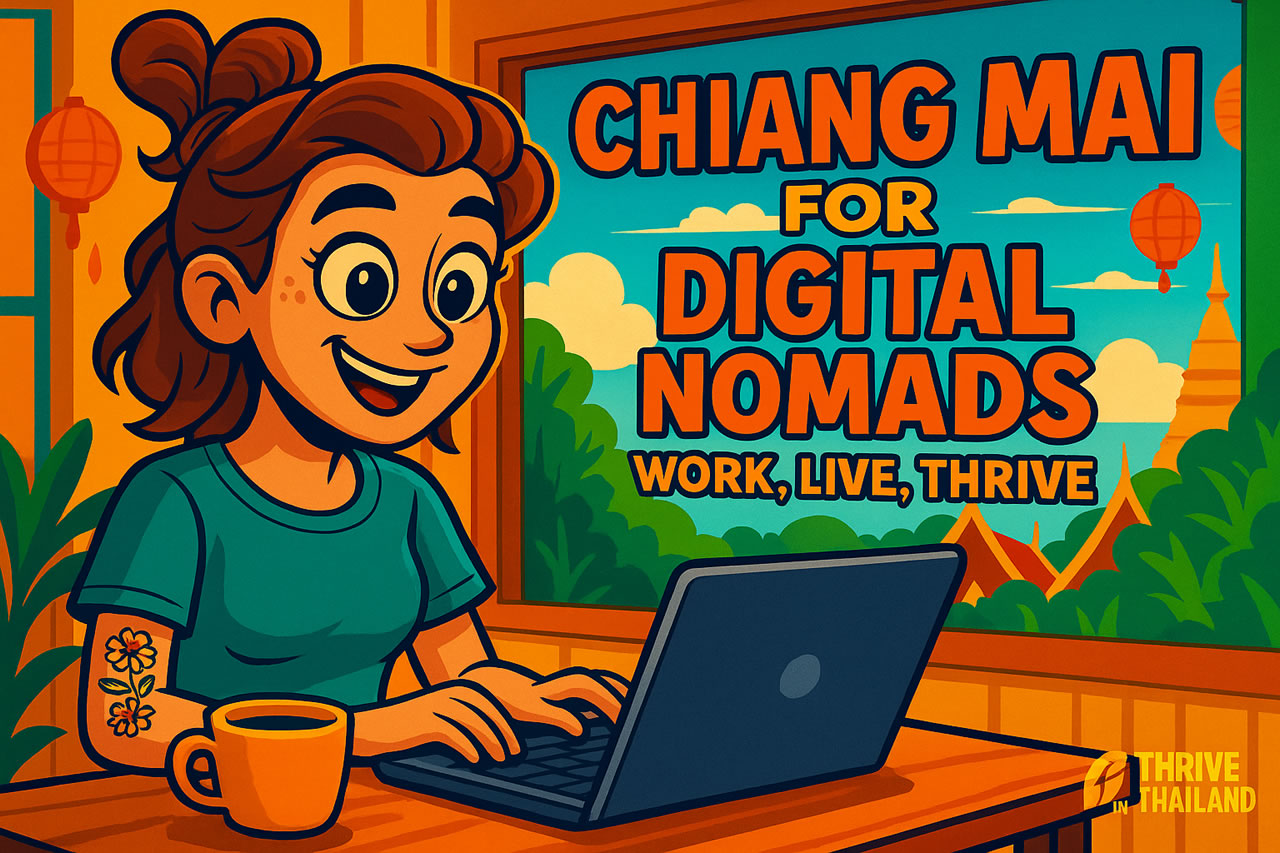Over the past decade, Chiang Mai has quietly transformed from a relaxed mountain city into one of the world’s top destinations for digital nomads. Its unique mix of affordability, convenience, and charm has drawn remote workers from all walks of life—freelancers, tech entrepreneurs, creatives, and content creators alike.
Whether you’re just starting your location-independent journey or looking for a long-term base with a strong support network, Chiang Mai delivers a rare combination of comfort, community, and inspiration.

1. Affordable Cost of Living
Chiang Mai is incredibly budget-friendly compared to Western cities. Nomads can live comfortably on THB 30,000–50,000/month ($850–$1,400 USD), with further options for both budget and upscale lifestyles.
- Apartments: Modern condos cost THB 6,000–15,000/month ($170–$420 USD).
- Food: Thai street food is as low as THB 50 ($1.40 USD) per meal, while trendy cafés and restaurants offer Western dishes at reasonable prices.
- Transport: Grab (like Uber), motorbike rentals, and red songthaews (shared taxis) make it easy to get around for just a few dollars per day.
📌 Chiang Mai offers a high quality of life at a fraction of Western costs—allowing nomads to stretch their income further.
✅ Chiang Mai offers a high quality of life at a fraction of Western costs—allowing nomads to stretch their income further. For a deeper breakdown across Thailand, check out my Cost of Living in Thailand guide, complete with sample budgets, a PDF download, and an interactive calculator.
2. Thriving Digital Nomad Community
Chiang Mai is one of the most established digital nomad hubs in the world, meaning you’re never just on your own. Whether you’re a freelancer, entrepreneur, or remote worker, there are plenty of meetups, coworking spaces, and networking events.
- Popular Facebook groups & communities:
- Chiang Mai Digital Nomads (great for advice and networking)
- Expats in Chiang Mai (useful for general expat life tips)
- Events & Meetups: Weekly gatherings like Nomad Coffee Club and skill-sharing workshops make it easy to connect with like-minded people.
📌 It’s an easy place to build friendships and find professional connections, making solo remote work less isolating.

3. Top-Notch Coworking Spaces & Cafés
Chiang Mai is packed with coworking spaces and laptop-friendly cafés offering fast Wi-Fi, air conditioning, and great coffee. Some of the best spots include:
Coworking Spaces:
- Punspace (multiple locations, popular with nomads)
- CAMP (inside Maya Mall, free Wi-Fi with a drink purchase)
- Yellow Coworking (great for networking and productivity)
Laptop-Friendly Cafés:
- Ristr8to (famous for award-winning coffee)
- The Barisotel by The Baristro (modern, stylish, and quiet)
- Free Bird Café (eco-conscious, supports local charities)
📌 Chiang Mai has everything remote workers need to stay productive—from professional coworking hubs to relaxing cafés.
4. Reliable & Fast Wi-Fi
Unlike some tropical destinations, Chiang Mai has solid internet infrastructure. Most coworking spaces and cafés offer speeds of 100–500 Mbps, and affordable home internet plans make it easy to set up a remote work-friendly environment.
📌 No need to stress about connectivity—Wi-Fi here is fast, reliable, and cheap.
✅ If reliable internet is step one, building a steady online income is step two. Here’s a platform trusted by thousands of digital nomads worldwide:

Get Straightforward, Affordable Training That Works!
- Step-by-Step Training
- Website Builder & Hosting
- Jaaxy (Keyword Research)
- AI Article Designer
- Live Expert Classes
- On-Demand Webinars
- Business Hubs
- Revenue Opportunity Finder
- Community & Mentorship
- No Upsells, No Contracts!
5. Great Weather & Laid-Back Lifestyle
Chiang Mai’s cooler climate and slower pace of life make it ideal for work-life balance. Compared to Bangkok’s hectic traffic and humidity, Chiang Mai offers:
- Mild, cooler temperatures from November to February (perfect for exploring).
- Beautiful nature spots like waterfalls, mountains, and national parks nearby.
- A relaxed, stress-free vibe, making it a great place to unwind after work.
📌 Chiang Mai has big-city conveniences without big-city chaos—ideal for focused work and relaxation.
6. Rich Culture & Outdoor Adventures
When not working, digital nomads can enjoy the best of Thai culture and nature.
- Explore Ancient Temples – Wat Phra That Doi Suthep, Wat Chedi Luang, and many more.
- Take a Weekend Getaway – Pai, Chiang Rai, and Doi Inthanon National Park are all nearby.
- Try Muay Thai or Yoga – Many nomads get into fitness at gyms, yoga studios, or Muay Thai training camps.
- Elephant Sanctuaries – Ethical experiences like the Elephant Nature Park allow you to interact with rescued elephants.
📌 Chiang Mai is not just a great place to work—it’s an amazing place to live, explore, and grow.
Take a look at my full guide to Best Remote Work Locations in Thailand .

7. Easy Long-Term Stay Options
While Thailand doesn’t have a dedicated digital nomad visa (yet), several visa types allow remote workers to stay in Chiang Mai for extended periods:
✅ Tourist Visa (TR) – Valid for 60 days, extendable once for 30 more days. Good for short stays with the option to explore.
✅ Education Visa (ED Visa) – Enroll in a Thai language or cultural course and study while working remotely. Often used for stays of 6–12 months.
✅ Destination Thailand Visa (DTV) – A 5-year multiple-entry visa for digital nomads, freelancers, and cultural creatives. Allows 180-day stays per entry, extendable once, with family members allowed. Applicants must be 20+ and working remotely for a foreign company or as freelancers abroad.
🚫 Visa Runs – Some nomads rely on frequent border runs by exiting and re-entering Thailand on visa-exempt entries or back-to-back tourist visas. While this can work short-term, it’s increasingly risky and not a reliable long-term strategy. Immigration scrutiny has tightened, and overuse may result in denied entry.
📌 With the arrival of the DTV and other visa types, Thailand offers more flexible stay options than ever. While visa runs may still be a temporary workaround, securing a proper long-stay visa is the smarter and safer move.
8. A Few Things to Keep in Mind
While Chiang Mai ticks most boxes for digital nomads, no place is perfect. Here are a few challenges to be aware of:
- Burning Season (Air Pollution): From February to April, surrounding farmland is often set ablaze to clear crops, resulting in hazardous air quality. Many nomads choose to travel elsewhere during these months.
- Visa Limitations: Despite being nomad-friendly, Thailand doesn’t (yet) offer a specific digital nomad visa. Some travelers rely on visa runs or language school visas, which can be inconvenient or unreliable long-term.
- Tourism & Growth Pressures: As Chiang Mai grows in popularity, traffic congestion and overtourism are becoming more noticeable—especially around Nimmanhaemin Road and the Old City.
📌 Most remote workers find the pros far outweigh the cons, but it’s good to plan ahead—especially if you’re staying longer than a few months.
9. Healthcare & Medical Services
Chiang Mai is known for its excellent and affordable private healthcare—an often overlooked advantage for digital nomads. Hospitals like Chiang Mai Ram and Bangkok Hospital Chiang Mai offer international-standard treatment, English-speaking staff, and short wait times. Whether it’s a quick check-up, dental work, or a medical emergency, quality care is easily accessible.
📌 Health issues happen—even on the road. Chiang Mai’s reliable medical services offer peace of mind for remote workers and long-stay expats alike.
Is Chiang Mai Still the Digital Nomad Capital?
Absolutely! Chiang Mai remains a top choice for remote workers due to its:
✅ Affordable cost of living – Live well for under $1,500/month.
✅ Huge digital nomad community – Easy to network and make friends.
✅ Excellent coworking spaces & cafés – Perfect for remote work.
✅ Fast Wi-Fi – No internet worries, even for high-bandwidth work.
✅ Relaxed lifestyle & amazing culture – Great for work-life balance.
Whether you’re a first-time digital nomad or an experienced remote worker, Chiang Mai offers everything you need to thrive. It’s no wonder so many people come for a few months and end up staying for years!
How long did you plan to stay… and how long did you actually stay? Tell me your Chiang Mai story!

